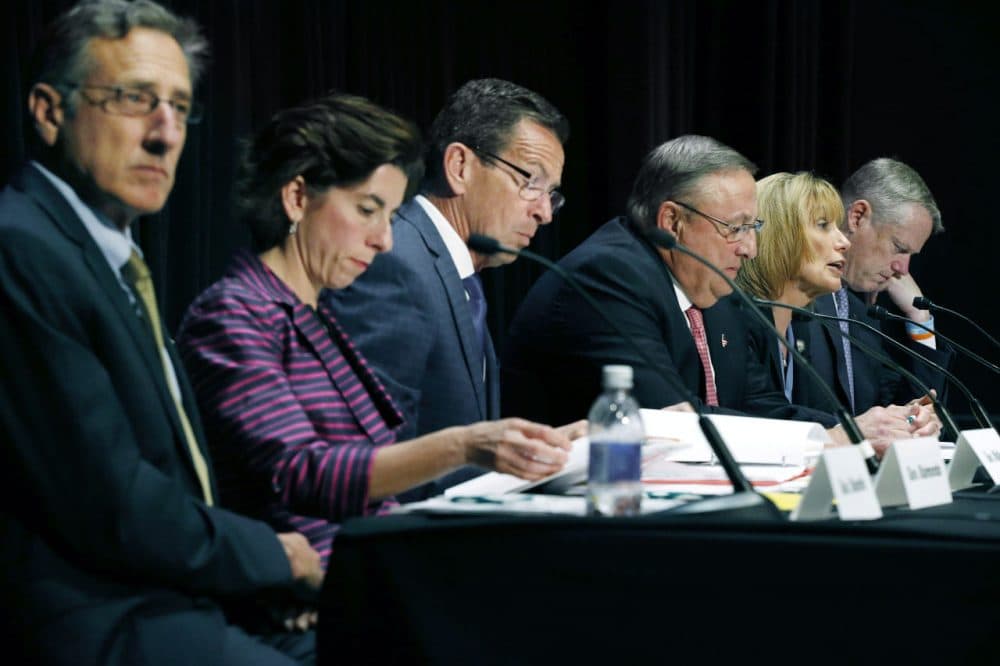Advertisement
New England Governors Converge To Address Opioid Epidemic

Pressing for the same or nearly the same limits on opioid prescriptions is one of the ways New England’s Republican and Democratic governors are working together to address the drug epidemic.
The six regional governors gathered in Boston Tuesday for an opioid panel.
There are some signs that efforts to slow the surge of opioid overdoses are working, but the death toll is grim. Narcan, or naloxone, the drug that reverses the effects of many overdoses, is becoming more widely available — and that's a good thing, says Gov. Charlie Baker.
"We lost 1,500 people in Massachusetts in 2015, but my own speculation, based on the data I've seen, makes me think the number without Narcan would have been north of 5,000," he said. "And it has a ton of, still, negative momentum."
Baker and his five New England colleagues agree on a few ways to try and stop that momentum.
One is requiring that doctors limit their use of opioids (such as Oxycontin or Vicodin) to treat acute pain. But just how low should they go? Massachusetts and Maine recently imposed seven-day caps on first-time opioid prescriptions. A new law in Vermont sets a lower limit, in the range of just 10 pills.
Rhode Island Gov. Gina Raimondo says the governors are trying to coordinate these regulations.
"So, for instance in Rhode Island, we’re making sure [of] a five-day limit for an initial prescription and you heard from other governors they’re going in the same direction, since a lot of people cross borders and we want to be as coordinated as possible," she said.
The governors spoke to an international conference of physicians who prescribe or study opioids and urged them to reduce opioid prescribing on their own.
Dr. Paul Sloan, a conference co-chair, is professor of anesthesiology and pain medicine at the University of Kentucky. He says doctors are thinking about the minimum amount needed to cope with acute pain.
Advertisement
"We as physicians have to work with that, that’s the environment which we’re in when we’re trying to deal with public health issues, there’s just no way around that," he said.
The Massachusetts Medical Society says 14,000 online courses on responsible opioid pain management have been completed by nearly 5,000 physicians since late May 2015.
But there are lots of stories about doctors or dentists who are still sending patients home with a 30-day or greater supply of opioid painkillers.
New Hampshire Gov. Maggie Hassan says patients need more nonmedical options, like acupuncture or physical therapy, for treating pain
"We need to find a way to make sure that people can get the right kind of pain treatment,” Hassan said. “This is a real challenge: Find that right kind of pain care that isn’t the delivery of an opioid.”
The region's governors are also pledging to increase efforts to stop the street supply of heroin, fentanyl and other addictive drugs. But for Vermont’s Peter Shumlin that’s a more difficult problem.
"We should keep doing all the things we can to slow down illicit drugs into this country, but no one’s figured out the silver bullet for how to get that done," he said. "I do believe I have the answer for reducing this crisis. It is to stop passing out opiates like candy."
Shumlin blames pharmaceutical firms and the FDA for making opioids widely available. He says the next president should fire everyone at the FDA who has signed off on increasingly powerful pain drugs.
In response to Shumlin’s critique, an FDA spokesperson sent a speech in which the agency commissioner talks about the difficulty of balancing a drug’s pain benefit against its potential for misuse, and about the FDA’s legal obligation to approve most generic versions of a drug.
Correction: Because of inaccurate information given to WBUR, an earlier version of this story misstated the period of time in which nearly 5,000 prescribers have completed medical society courses on pain management. We regret the error.
This article was originally published on June 07, 2016.
